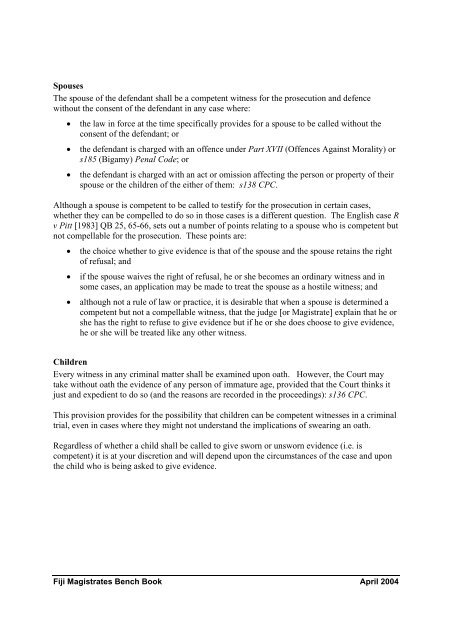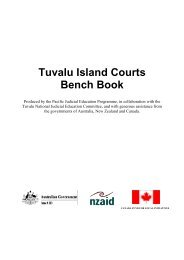Fiji Magistrates Bench Book - Federal Court of Australia
Fiji Magistrates Bench Book - Federal Court of Australia
Fiji Magistrates Bench Book - Federal Court of Australia
You also want an ePaper? Increase the reach of your titles
YUMPU automatically turns print PDFs into web optimized ePapers that Google loves.
Spouses<br />
The spouse <strong>of</strong> the defendant shall be a competent witness for the prosecution and defence<br />
without the consent <strong>of</strong> the defendant in any case where:<br />
• the law in force at the time specifically provides for a spouse to be called without the<br />
consent <strong>of</strong> the defendant; or<br />
• the defendant is charged with an <strong>of</strong>fence under Part XVII (Offences Against Morality) or<br />
s185 (Bigamy) Penal Code; or<br />
• the defendant is charged with an act or omission affecting the person or property <strong>of</strong> their<br />
spouse or the children <strong>of</strong> the either <strong>of</strong> them: s138 CPC.<br />
Although a spouse is competent to be called to testify for the prosecution in certain cases,<br />
whether they can be compelled to do so in those cases is a different question. The English case R<br />
v Pitt [1983] QB 25, 65-66, sets out a number <strong>of</strong> points relating to a spouse who is competent but<br />
not compellable for the prosecution. These points are:<br />
• the choice whether to give evidence is that <strong>of</strong> the spouse and the spouse retains the right<br />
<strong>of</strong> refusal; and<br />
• if the spouse waives the right <strong>of</strong> refusal, he or she becomes an ordinary witness and in<br />
some cases, an application may be made to treat the spouse as a hostile witness; and<br />
• although not a rule <strong>of</strong> law or practice, it is desirable that when a spouse is determined a<br />
competent but not a compellable witness, that the judge [or Magistrate] explain that he or<br />
she has the right to refuse to give evidence but if he or she does choose to give evidence,<br />
he or she will be treated like any other witness.<br />
Children<br />
Every witness in any criminal matter shall be examined upon oath. However, the <strong>Court</strong> may<br />
take without oath the evidence <strong>of</strong> any person <strong>of</strong> immature age, provided that the <strong>Court</strong> thinks it<br />
just and expedient to do so (and the reasons are recorded in the proceedings): s136 CPC.<br />
This provision provides for the possibility that children can be competent witnesses in a criminal<br />
trial, even in cases where they might not understand the implications <strong>of</strong> swearing an oath.<br />
Regardless <strong>of</strong> whether a child shall be called to give sworn or unsworn evidence (i.e. is<br />
competent) it is at your discretion and will depend upon the circumstances <strong>of</strong> the case and upon<br />
the child who is being asked to give evidence.<br />
<strong>Fiji</strong> <strong>Magistrates</strong> <strong>Bench</strong> <strong>Book</strong> April 2004
















